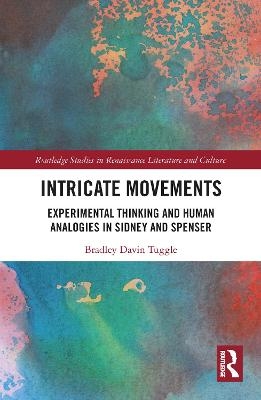
Intricate Movements
Experimental Thinking and Human Analogies in Sidney and Spenser
Seiten
2021
Routledge (Verlag)
978-1-032-09361-1 (ISBN)
Routledge (Verlag)
978-1-032-09361-1 (ISBN)
Renaissance humanism takes as one of its subjects for inquiry the category of the human itself. This volume seeks to return critical assessments of the period's engagement with the non-human back to human concerns.
Renaissance humanism takes as one of its subjects for inquiry the category of the human itself. As Intricate Movements: Experimental Thinking and Human Analogies in Sidney and Spenser shows, late sixteenth-century English poets found some remarkably radical ways to interrogate and redefine the status of humans.
The recent vogue for posthumanist theory encourages a view of non-human objects and animals in Renaissance literature as pathways to essentially anti-humanist thought. On the contrary, this book argues that Sidney, Spenser, and their contemporaries employ animals, earth, buildings, and fictions as analogies employed toward a better understanding of what makes humans a special category, both ontologically and ethically. Horses and riders are studied by Sidney as a way to understand readers and writers; the 1580 Dover Straits Earthquake provides Spenser and Gabriel Harvey an opportunity to explore human emotion; liturgical spaces are represented by Sidney and Spenser in order to reassess human community; and fictional persons are interrogated by Spenser as models for human interpersonal epistemology.
This volume seeks to return critical assessments of the period's engagement with the non-human back to human concerns. Focusing on several early modern analogies between human and non-human entities, Intricate Movements argues Sidney's and Spenser's thinking about the human is both radically experimental and, ultimately, humane.
Renaissance humanism takes as one of its subjects for inquiry the category of the human itself. As Intricate Movements: Experimental Thinking and Human Analogies in Sidney and Spenser shows, late sixteenth-century English poets found some remarkably radical ways to interrogate and redefine the status of humans.
The recent vogue for posthumanist theory encourages a view of non-human objects and animals in Renaissance literature as pathways to essentially anti-humanist thought. On the contrary, this book argues that Sidney, Spenser, and their contemporaries employ animals, earth, buildings, and fictions as analogies employed toward a better understanding of what makes humans a special category, both ontologically and ethically. Horses and riders are studied by Sidney as a way to understand readers and writers; the 1580 Dover Straits Earthquake provides Spenser and Gabriel Harvey an opportunity to explore human emotion; liturgical spaces are represented by Sidney and Spenser in order to reassess human community; and fictional persons are interrogated by Spenser as models for human interpersonal epistemology.
This volume seeks to return critical assessments of the period's engagement with the non-human back to human concerns. Focusing on several early modern analogies between human and non-human entities, Intricate Movements argues Sidney's and Spenser's thinking about the human is both radically experimental and, ultimately, humane.
Brad Tuggle earned an M.Phil. (with thesis) in Renaissance English Literature at Trinity College, Oxford as a Rhodes Scholar. He then earned his Ph.D. at the University of Virginia, working with Elizabeth Fowler, James Nohrnberg, Katharine Maus, and Clare Kinney. After teaching stints at Sewanee and Spring Hill College, he is now an Associate Professor in the Honors College at The University of Alabama, his alma mater. His work has been published in Spenser Studies, Sidney Journal, and Explicator.
Entry
| Erscheinungsdatum | 01.07.2021 |
|---|---|
| Reihe/Serie | Routledge Studies in Renaissance Literature and Culture |
| Verlagsort | London |
| Sprache | englisch |
| Maße | 152 x 229 mm |
| Gewicht | 453 g |
| Themenwelt | Geisteswissenschaften ► Sprach- / Literaturwissenschaft ► Anglistik / Amerikanistik |
| Geisteswissenschaften ► Sprach- / Literaturwissenschaft ► Literaturwissenschaft | |
| ISBN-10 | 1-032-09361-7 / 1032093617 |
| ISBN-13 | 978-1-032-09361-1 / 9781032093611 |
| Zustand | Neuware |
| Informationen gemäß Produktsicherheitsverordnung (GPSR) | |
| Haben Sie eine Frage zum Produkt? |
Mehr entdecken
aus dem Bereich
aus dem Bereich
Poetik eines sozialen Urteils
Buch | Hardcover (2023)
De Gruyter (Verlag)
CHF 83,90
Buch | Softcover (2024)
belleville (Verlag)
CHF 27,95


